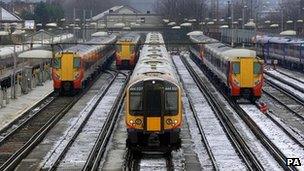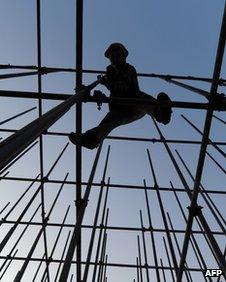China to the UK's aid?
- Published
- comments

Could Chinese investment help get the British economy back on track?
Here comes China once again, riding to the rescue of a struggling European nation, delving into its bulging wallet to help out. That at least is what we are encouraged to believe from today's talk of China investing in UK infrastructure. But it's not quite so simple.
The logic of it sounds unimpeachable. China has an urgent need to find ways to invest the foreign exchange it is hoarding, Britain has an urgent need to stimulate growth and creaking, outdated infrastructure. So is this a partnership just waiting to happen?
In today's Financial Times the head of the China Investment Corporation, the country's sovereign wealth fund, Lou Jiwei, writes, external that "infrastructure in Europe and the US badly needs more investment". Then he goes on to say the China Investment Corporation is keen to "participate in... the UK infrastructure sector".
Mr Lou has about $400bn (£256bn) of China's huge foreign exchange reserves under his control and a mandate to invest it to earn decent returns for Beijing. UK Chancellor George Osborne is looking for a mere $30bn for his National Infrastructure Plan and needs to reassure voters that the UK can get back to growth.
So it should be an easy deal. Mr Osborne may be thanking the Chinese for what looks like a vote of confidence in his plan. He can presumably say to other investors: "Look the Chinese are keen, you should be too." China looks both savvy and generous. So everybody wins.
Well, not quite so fast.
Spending hangover
The first thing to say is that more Chinese investment overseas should be welcomed. China has built up its reserves through its surpluses with countries like the UK. So Beijing is piling up money and the relationship is unbalanced. Investing some of that cash directly into infrastructure projects in the UK, rather than buying UK government bonds, can help create a more balanced partnership.

China has embarked on a building marathon over the last decade
But there are a couple of caveats. There is a widespread belief that China has found a secret recipe for growth which basically involves building lots of stuff - infrastructure, railways, airports, roads and the like. So, the logic goes, the UK just needs to take a leaf out of China's book and build things too - hey presto, problem solved.
But not everyone is quite so convinced that throwing money at infrastructure projects is the best idea for growth. Quite a few of those critics are here in China.
In his article Lou Jiwei writes that "infrastructure spending is an important way to boost consumption, and it also acts as a spur to economic growth. One need only look at China to see what can be achieved... in the wake of the 2008 financial crisis, the government introduced a 4tn yuan economic stimulus package, with a large part of the money directed into infrastructure. As a result China's annual economic growth rose from 6.8% to more than 10% from late 2008 to the end of 2009."
The problem is the spending binge can lead to a serious hangover. The key question is whether the stuff you are building is actually worth the investment? Will it generate benefits or be a burden on future taxpayers?
One prominent Chinese economist I was talking to yesterday was saying he thought China's senior policymakers had realised their stimulus programme had not been worth it, the investments they fear are wasteful, they have simply created more problems, and he pointed to the example of high-speed rail.
China has already been expressing an interest in Britain's plans to build high-speed railway links. China's own high-speed railway network has been lauded as a symbol of this country's far-sighted infrastructure investment policy. But there are many here who now fear the high-speed rail network may turn out to be a white elephant, too expensive, saddled with massive debts that it will never pay off - a wealth destroyer not a wealth generator.
The terrible crash at Wenzhou earlier this year in which 40 people died when one bullet train rammed into another has also caused alarm bells to ring. It has been blamed on a variety of causes, faulty equipment, poor management to name two. But the basic question is whether the rapid roll-out has led to corners being cut.
Good PR?
In his Financial Times article Mr Lou goes on to call for what look like special terms for any investment in the UK. He asks for "pro-investment policies to create an attractive environment" including "reducing taxes and offering bank loans at discounted rates", and says governments seeking external investment "should relax regulatory restrictions".
As a potential investor the head of CIC will of course be seeking the best deal he can get. But if he's so convinced infrastructure is a good investment, then does he really need relaxed terms? One of the concerns in China is that cheap funding has led to poor investment decisions, and relaxing restrictions in a rush to develop may not be a good thing for all sorts of reasons - financial, environmental or safety-related.
The other caveat is that we've heard some of this before. Chinese officials have at several points in the past year been quick to say how interested they are in all sorts of investments. We have been told that they are holding talks about buying Italian bonds, or are looking at Greek debt, or Spanish debt. But there is a feeling that there is more talk than action going on.
In fact, I'd suggest, what we have seen is that China is becoming quite savvy at getting good public relations from this speculation. It's not telling us how it's going to invest, so much as creating the impression that it has the ability and desire to "save the world economy".
A few weeks ago the suggestion China would buy Eurobonds came just as the head of the European bail-out fund was in Beijing. He went away empty handed. Now it's the idea of investing in UK infrastructure that comes just ahead of the UK chancellor's midweek statement on how he plans to boost growth. Good timing for maximum PR impact.
So first we have to see whether China is going to invest its cash. Then the question is whether the investment is worthwhile for all involved. And remember, when it comes to the real benefits of some of China's own infrastructure programmes the jury is yet to deliver its verdict.